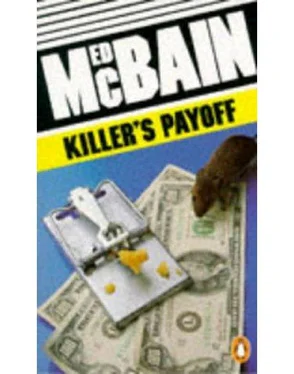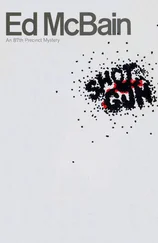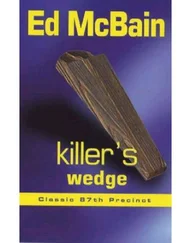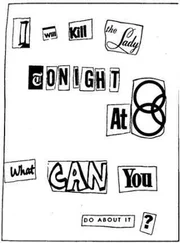McBain, Ed - Killer's Payoff
Здесь есть возможность читать онлайн «McBain, Ed - Killer's Payoff» весь текст электронной книги совершенно бесплатно (целиком полную версию без сокращений). В некоторых случаях можно слушать аудио, скачать через торрент в формате fb2 и присутствует краткое содержание. Жанр: Полицейский детектив, на английском языке. Описание произведения, (предисловие) а так же отзывы посетителей доступны на портале библиотеки ЛибКат.
- Название:Killer's Payoff
- Автор:
- Жанр:
- Год:неизвестен
- ISBN:нет данных
- Рейтинг книги:5 / 5. Голосов: 1
-
Избранное:Добавить в избранное
- Отзывы:
-
Ваша оценка:
- 100
- 1
- 2
- 3
- 4
- 5
Killer's Payoff: краткое содержание, описание и аннотация
Предлагаем к чтению аннотацию, описание, краткое содержание или предисловие (зависит от того, что написал сам автор книги «Killer's Payoff»). Если вы не нашли необходимую информацию о книге — напишите в комментариях, мы постараемся отыскать её.
Killer's Payoff — читать онлайн бесплатно полную книгу (весь текст) целиком
Ниже представлен текст книги, разбитый по страницам. Система сохранения места последней прочитанной страницы, позволяет с удобством читать онлайн бесплатно книгу «Killer's Payoff», без необходимости каждый раз заново искать на чём Вы остановились. Поставьте закладку, и сможете в любой момент перейти на страницу, на которой закончили чтение.
Интервал:
Закладка:
“No, I’m sorry, I can’t. One of them had a very strange name, but I don’t remember what it was.”
“I see. When did you leave the lodge?”
“On a Saturday, I think.”
“Do you remember the date?”
“The eighth or the ninth, I guess. This was the first week in September.”
“When did Kramer leave?”
“The same day, I think.”
“And the other men?”
“We all left at the same time, I believe. We’d only gone up there for a week. I’m a little hazy on all this because I was more concerned with my wife than with hunting. The only thing I shot all the while I was there was a crow.”
“Did Kettering threaten Kramer’s life?”
“No. He asked him to step outside with him. That was all.”
“Did he seem very angry?”
“Yes.”
“Angry enough to kill?”
“I don’t know.”
“Mmmm.”
“Why do you think Kettering killed Kramer?”
“We’re not sure he did, Mr. Ruther. But he did have a possible motive, and he seems to have vanished. There’s also one other thing.”
“What’s that?”
“Kettering was a good hunter, we’ve been told. Kramer was shot with a hunting rifle.”
“There must be hundreds of men in this city with hunting rifles,” Ruther said. “I have one myself.”
“Do you, Mr. Ruther?” Hawes asked.
Ruther smiled. “Or shouldn’t I have said that?”
“What kind of a gun do you own, Mr. Ruther?”
“A Marlin. Twenty-two caliber. Eight-shot.”
Hawes nodded. “Kramer was killed with a .300 Savage.”
“Would you like to see my gun?” Ruther asked.
“That won’t be necessary,” Hawes said.
“How do you know I’m not lying? I could own two guns, you know.”
“I know. But if you killed Sy Kramer, you’ve probably disassembled the Savage and buried it by now.”
“I suppose so,” Ruther said reflectively. “I hadn’t thought of that.”
Hawes rose. “If you should happen to remember the names of the other two men, give me a call, won’t you? Here’s my card.” He took the card from his wallet and put it on Ruther’s desk.
Ruther looked at the card for a moment and then said, “You knew about the argument between Kramer and me. You knew we were at Kukabonga Lodge. You knew Kettering’s name, and you knew my name.” He smiled. “You’ve been to Kukabonga Lodge, haven’t you?”
“Yes.”
“And you spoke with the owner, didn’t you?”
“Yes.”
“Then you already know the names of the other two men, don’t you?”
“Yes, Mr. Ruther,” Hawes said. “I already know their names.”
“Then why did you ask me?”
Hawes shrugged. “Routine,” he said.
“Do you think I had anything to do with Kramer’s death?”
“Did you?”
“No,” Ruther said.
Hawes smiled. “Then you have nothing to worry about, Mr. Ruther.” He started for the door.
“Just a second, Hawes,” Ruther said. There was something new in his voice, the unmistakable ring of command. The tone surprised Hawes. He turned sharply. Ruther had stood up and was coming around the desk.
“What is it, Mr. Ruther?”
“I don’t like being made a fool,” Ruther said. The dark eyes were darker now. The mouth was drawn into a thin line.
“Did someone make a fool of you?”
“You knew about those other two men. Were you trying to trap me?” Ruther asked.
“Trap you into what?”
For some reason the air in the office had become strained and tense. For a moment Hawes was confused, almost bewildered. The interview had gone well, smoothly. And yet, it was all changed now, and he looked at Ruther and saw a tightness about the man’s face. And looking into his eyes, he felt for the moment as if Ruther would spring at his throat.
“Trap me into saying something that didn’t jibe with your half-assed theories,” Ruther said.
“I have no theories,” Hawes said. Unconsciously he balled his fists. He expected Ruther to swing at him, and he wanted to be ready.
“Then why’d you try to trap me?”
“I didn’t,” Hawes said. “Mr. Ruther, you ought to know something every businessman in the world knows.”
“What’s that?” Ruther asked.
“How to stop when you’re winning.”
Ruther’s face went blank. For a moment he seemed undecided. And then he smiled.
“Forgive me,” he said. “It’s just…I thought you were trying to make a fool of me.”
“Let’s just forget it, shall we?” Hawes said.
“Fine,” Ruther said, extending his hand. “Let’s just both forget it.”
Hawes took the extended hand. “Sure,” he said. “Let’s just both forget it.”
13.
JOHN MURPHY looked like a Bengal Lancer.
He had a bald pate and a white mustache and a florid complexion and a pot belly. He looked like a retired colonel who had just come back from somewhere in the British Empire. He was not a retired colonel. He was a retired broker, and he spent his time clipping coupons within the walls of an old house in New Posquit, a suburb of the city. New Posquit was not Sand’s Spit. It was, as a matter of fact, in the opposite direction from Sand’s Spit. The houses in New Posquit were not new, nor did they cramp each other, elbows to buttocks.
Murphy’s old house rested on sixteen acres of rolling, wooded land. He was not a millionaire, but he would sooner move into an igloo than a Sand’s Spit development. New Posquit had golfing clubs and tennis clubs and yacht clubs. John Murphy belonged to all of them. Perhaps he belonged to them because he was a retired man who didn’t have a damned thing to do. Perhaps he belonged to them because he was a highly nervous man who couldn’t even hold a gin and tonic in his hands without causing the glass to tremble.
Or maybe he was nervous because he was being questioned by a cop.
Sitting opposite him that afternoon, Steve Carella noticed the tremble in the old man’s hands and wondered whether the old man could possibly hit the side of a barn on a hunting trip. Carella sat with his pad open in his lap, and he tried to take his notes effortlessly, calling as little attention to them as possible. With many people, the taking of notes became a hindrance to easy conversation. He had seen many people freeze up entirely as they watched the moving pencil. John Murphy was a highly nervous man, but Carella didn’t know whether he was habitually nervous or whether the presence of a cop had brought on the trembling.
“You just live here with your family, is that it?” Carella asked.
“Yes,” Murphy said. “That’s what I do. Yes.”
“How long have you been retired, Mr. Murphy?”
“Eleven years last month,” Murphy said. “Quit when I was fifty. I’m sixty-one now.”
“What do you do with your time?”
“Oh, I have things to do.”
“Like what?”
“I golf. I fish. I hunt.” Murphy shrugged. “I own a sports car. Raced it last year. I’m an excellent driver.”
“What kind of a car?”
“A Porsche.”
“Did you win the race?”
“I was in two races. Came in fourth in one, and second in the next.”
“Then you are a good driver.”
“Said so, didn’t I?” Murphy said. “You want a refill on that drink?”
“No, thank you. Are you a good hunter?”
“Lousy,” Murphy said. “My hands aren’t too steady. I’ve got ulcers. That’s how nervous I am.” He held out his hand. “Look at that,” he said.
“Mmm,” Carella said. “Mr. Murphy, can you tell me about a hunting trip you took last fall? A trip to Kukabonga Lodge?”
“Certainly,” Murphy said.
He began telling the story. Carella asked questions and took notes all the while. Murphy related the story of the argument over the clams, and the subsequent argument between Kramer and Kettering. His memory was excellent. He remembered all the men’s names, remembered details of clothing, even mimicked some of their voices. He told the story essentially the same way Jerry Fielding had told it to Hawes up at Kukabonga. When Carella later compared his notes with Hawes, he would learn that Frank Ruther had given the same story, too.
Читать дальшеИнтервал:
Закладка:
Похожие книги на «Killer's Payoff»
Представляем Вашему вниманию похожие книги на «Killer's Payoff» списком для выбора. Мы отобрали схожую по названию и смыслу литературу в надежде предоставить читателям больше вариантов отыскать новые, интересные, ещё непрочитанные произведения.
Обсуждение, отзывы о книге «Killer's Payoff» и просто собственные мнения читателей. Оставьте ваши комментарии, напишите, что Вы думаете о произведении, его смысле или главных героях. Укажите что конкретно понравилось, а что нет, и почему Вы так считаете.












